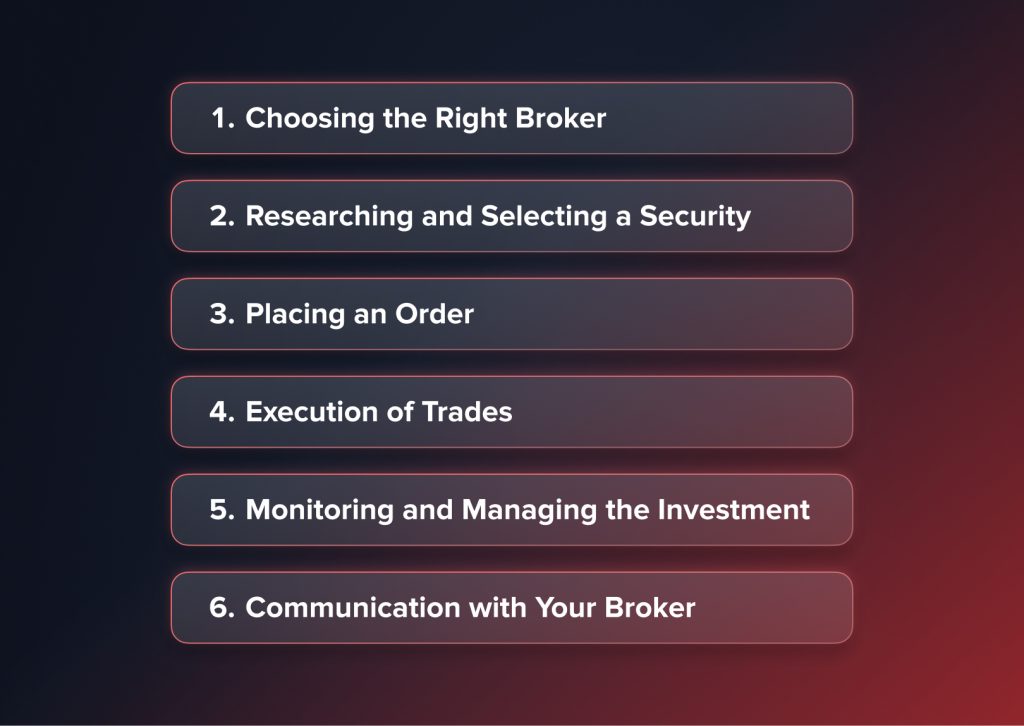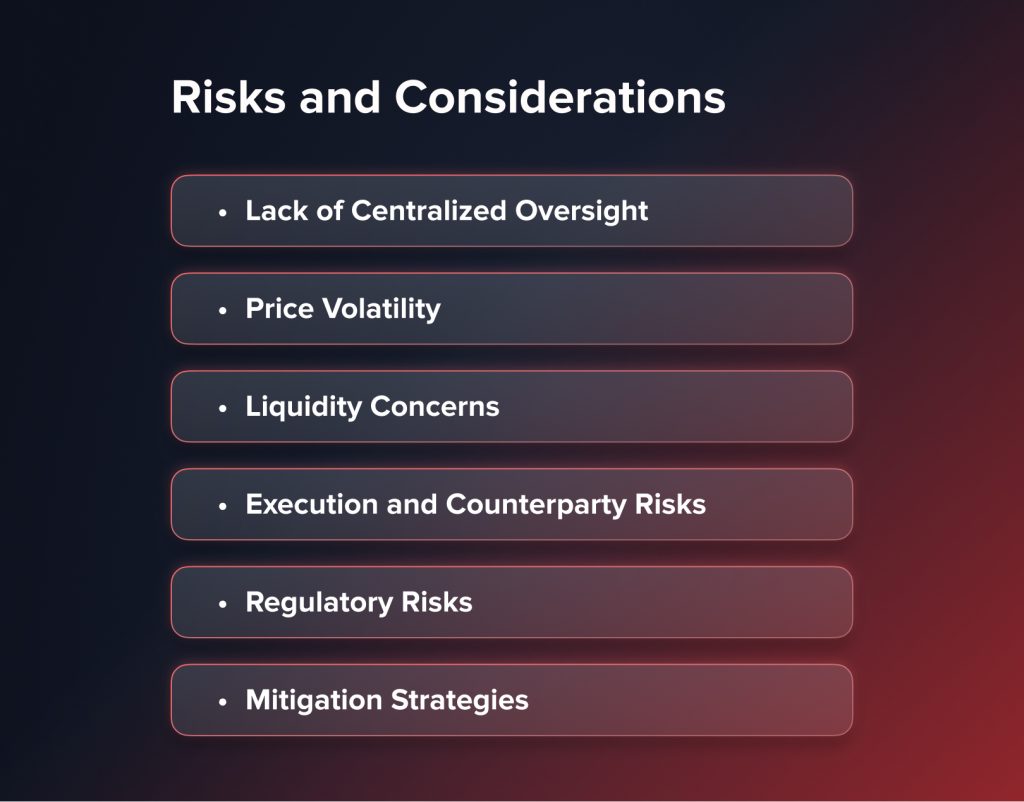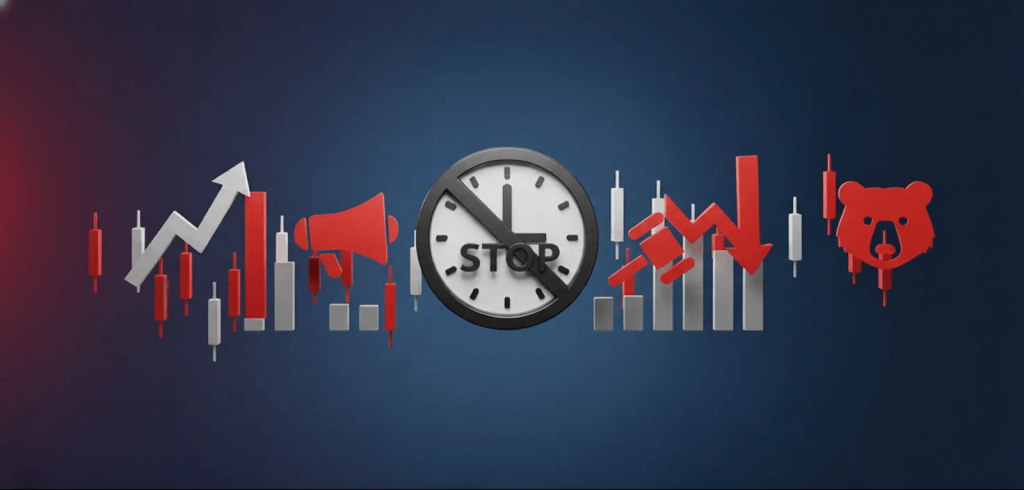
Giao dịch OTC: Cách giao dịch chứng khoán qua quầy
Mục lục
Một phương pháp phi tập trung để giao dịch chứng khoán không niêm yết trên các sàn giao dịch chính thức, giao dịch qua quầy (OTC) cung cấp một sự thay thế linh hoạt cho hệ thống thị trường dựa trên sàn giao dịch truyền thống. Giao dịch OTC diễn ra thông qua một mạng lưới các nhà môi giới và đại lý, cho phép các giao dịch diễn ra trực tiếp giữa các bên, khác với các thiết lập được kiểm soát chặt chẽ của Sở Giao dịch Chứng khoán New York hoặc Nasdaq. Thường là nơi duy nhất để giao dịch một số tài sản nhất định, hệ thống này cho phép bạn giao dịch các chứng khoán khác nhau như cổ phiếu doanh nghiệp nhỏ, trái phiếu, công cụ phái sinh, ngoại tệ, và thậm chí cả tiền điện tử. Việc chọn nền tảng giao dịch phù hợp và hiểu cách tiếp cận OTC được cung cấp là những bước quan trọng cho các nhà đầu tư nhìn vào phạm vi tài sản tài chính rộng hơn này.
Tóm tắt nhanh về giao dịch OTC
Cụm từ viết tắt OTC có nghĩa là "Giao dịch ngoài sàn" và có nghĩa là "không còn được xử lý tại các thị trường tập trung như Sở Giao dịch Chứng khoán New York hoặc Nasdaq." Thay vào đó, các giao dịch OTC diễn ra trong một mạng lưới các nhà môi giới - nhà đầu tư, những người thương lượng giá cả trên cơ sở cá nhân.
Dưới đây là tóm tắt một số thông tin cơ bản cần biết về Giao dịch OTC:
Giao dịch OTC là gì
Một hệ thống giao dịch chứng khoán bởi các nhà môi giới-đại lý của tất cả các loại cho chứng khoán không giao dịch trên các sàn giao dịch chính thức đã được niêm yết.
Giao dịch OTC cái gì?
Cổ phiếu Micro-Cap, Small Caps, Trái phiếu & Thu nhập Cố định, ADR's - Chứng chỉ lưu ký Mỹ, Derivatives tùy chỉnh, Forex, Tiền điện tử, v.v. Đối với tài sản kỹ thuật số, giao dịch OTC thường bổ sung cho giao dịch tiền điện tử thông thường trên các sàn giao dịch.
Cách thức giao dịch OTC hoạt động
Tất cả các giao dịch diễn ra qua các hệ thống điện tử không được đưa vào sổ đặt hàng công khai mà thay vào đó, giữa các giao tiếp trực tiếp của Nhà môi giới - Đại lý.
Các cấp chính của Thị trường OTC
- OTCQX là tiêu chuẩn báo cáo được tôn trọng nhất,
- OTCQB dành cho các công ty khởi nghiệp với báo cáo tối thiểu,
- Thị trường mở Pink có yêu cầu báo cáo tối thiểu/không có.
Lợi ích
- Truy cập vào các công ty ngách hoặc giai đoạn đầu,
- Cơ hội để đầu tư vào các nhà phát hành nước ngoài,
- Các tùy chọn tài chính linh hoạt và tùy chỉnh.
Rủi ro
- Thiếu minh bạch,
- Biến động cực kỳ cao,
- Vấn đề thanh khoản,
- Thực hiện đối kháng và nhược điểm giao dịch, điều này làm cho quản lý rủi ro chặt chẽ trở nên cần thiết.
Bạn cũng có thể thích

Hiểu biết về Thị trường OTC và Chứng khoán
Khác với các mạng lưới trao đổi chính thức và được công nhận rộng rãi, các thị trường giao dịch phi tập trung hoạt động mà không có sàn giao dịch trung tâm. Thông qua mạng lưới môi giới, các giao dịch được tiến hành trực tiếp giữa các bên trong các thị trường OTC bằng cách sử dụng công nghệ điện tử và các cuộc gọi điện thoại để thực hiện giao dịch. Cấu trúc phi tập trung này cho phép giao dịch một loạt các chứng khoán mà sẽ không có sẵn trong các thị trường bị kiểm soát và quản lý chặt chẽ hơn.
Sự khác biệt chính: Thị trường OTC so với Sàn giao dịch chứng khoán
Các thị trường OTC và các sàn giao dịch truyền thống rất khác nhau về cách thức hoạt động, nhưng cả hai thị trường đều cung cấp một phương tiện để giao dịch chứng khoán tài chính. Vì sự khác biệt này, các nhà đầu tư cần hiểu rõ những lợi thế và bất lợi của từng thị trường khi đánh giá rủi ro, tính minh bạch và thanh khoản của các giao dịch của họ trước khi thực hiện bất kỳ giao dịch nào.
| Tính năng | Thị trường OTC | Sàn giao dịch chứng khoán |
| Cấu trúc | Mạng lưới phi tập trung của các nhà môi giới | Thị trường tập trung với sổ lệnh |
| Quy định | Các yêu cầu tuân thủ ít hơn | Các tiêu chuẩn báo cáo nghiêm ngặt |
| Minh bạch giá cả | Thấp hơn, giá được thương lượng riêng tư | Cao, báo giá công khai theo thời gian thực |
| Tính thanh khoản | Thường thấp | Thường cao |
| Các yêu cầu đối với nhà phát hành | Tối thiểu đến trung bình | Rộng rãi |
| Thực hiện giao dịch | Thông qua môi giới | Khớp tự động qua hệ thống sàn giao dịch |
| Cấp độ rủi ro | Cao hơn do biến động | Thấp hơn do tính minh bạch |
| Nhà phát hành | Các công ty giai đoạn đầu, công ty nước ngoài, các thực thể bị hủy niêm yết | Các công ty công khai đã được thiết lập tốt |
Cả thị trường OTC và các sàn giao dịch truyền thống đều cho phép các nhà đầu tư mua và bán cổ phiếu của các công ty, trái phiếu, quyền chọn, v.v. Tuy nhiên, cách thức hoạt động của mỗi thị trường là rất khác nhau. Các nhà đầu tư phải hiểu sự khác biệt này để đưa ra quyết định thông minh liên quan đến các rủi ro liên quan đến từng thị trường, tính minh bạch và tính thanh khoản mà mỗi thị trường cung cấp trước khi đưa ra quyết định đầu tư của họ.
Tại sao các công ty chọn OTC
Các công ty không tình cờ chọn niêm yết trên Thị trường OTC; thường thì, họ sử dụng OTC như một lựa chọn chiến lược cho những nhà phát hành có thể không muốn hoặc không có khả năng đáp ứng các yêu cầu niêm yết của các sàn giao dịch chứng khoán chính thức. Trong khi một số công ty đang ở giai đoạn tăng trưởng ban đầu, những công ty khác là các tập đoàn đa quốc gia đã được thành lập đang tìm kiếm vốn từ Mỹ mà không muốn trải qua quy trình niêm yết đầy đủ trên sàn giao dịch.
- Chi phí tuân thủ & niêm yết thấp hơn - OTC giúp giảm chi phí tuân thủ quy định, kiểm toán và quản lý, so với các sàn giao dịch chứng khoán lớn, làm cho chúng trở thành một lựa chọn hấp dẫn cho các công ty nhỏ và khởi nghiệp muốn tiếp cận nhà đầu tư với chi phí thấp hơn.
- Có khả năng tiếp cận các nhà đầu tư Hoa Kỳ được đại diện bởi ADR - Các nhà phát hành quốc tế thường tiến hành hoạt động giao dịch của họ thông qua một chương trình ADR trên thị trường OTC để tăng cường khả năng nhìn thấy và thanh khoản cho các nhà đầu tư Hoa Kỳ mà không phải tuân thủ các yêu cầu về quản trị của một sàn giao dịch chứng khoán.
- Độ linh hoạt cho các doanh nghiệp trong giai đoạn phát triển ban đầu hoặc trong các thị trường ngách - Các công ty có phân loại hoạt động hẹp, trong chu kỳ phát triển ban đầu, hoặc có ít hoặc không có lịch sử tài chính có thể chọn tham gia vào một thị trường OTC nơi các yêu cầu về quy định và báo cáo ít nghiêm ngặt hơn.
- Tiếp tục Giao dịch Sau khi Bị Hủy Niêm yết - Các công ty đã bị hủy niêm yết khỏi các sàn giao dịch chứng khoán lớn do vấn đề tài chính hoặc tuân thủ vẫn có thể giao dịch OTC và cung cấp tính thanh khoản liên tục cho các nhà đầu tư trong khi tái cấu trúc.
Các loại chứng khoán giao dịch OTC
- Cổ phiếu nhỏ và vi mô: Nhiều công ty giao dịch trên thị trường OTC là rất nhỏ, thường được gọi là cổ phiếu vi mô. Những doanh nghiệp này có thể hoạt động trong các lĩnh vực cụ thể hoặc đang ở giai đoạn đầu của sự phát triển. Nhiều khi, họ chọn giao dịch OTC vì họ muốn tránh những chi phí cao liên quan đến việc niêm yết hoặc họ không thể đáp ứng các tiêu chí tài chính hoặc pháp lý để niêm yết trên các sàn giao dịch lớn hơn.
- Chứng chỉ lưu ký Mỹ (ADRs): Một lượng lớn giao dịch OTC được đại diện bởi Chứng chỉ lưu ký Mỹ (ADRs), cho phép các nhà đầu tư Mỹ mua cổ phiếu của các tập đoàn quốc tế mà không gặp phải những khó khăn trong việc xử lý các quy định về chứng khoán nước ngoài hoặc chuyển đổi tiền tệ. Những chứng khoán này cung cấp cách tiếp cận đơn giản hơn đến thị trường chứng khoán nước ngoài và rất quan trọng cho việc đa dạng hóa chiến lược đầu tư.
- Các sản phẩm phái sinh: Ngược lại với các sản phẩm phái sinh tiêu chuẩn được bán trên sàn giao dịch, các thị trường OTC phù hợp hơn cho các sản phẩm phái sinh được điều chỉnh theo yêu cầu cá nhân của các nhà giao dịch. Các hợp đồng hoán đổi, hợp đồng kỳ hạn và các quyền chọn đặc biệt là một số ví dụ. Các sản phẩm phái sinh OTC được thiết kế để cho phép các bên phòng ngừa rủi ro hoặc đầu cơ vào những biến động giá trong tương lai của các tài sản cơ sở như hàng hóa, tiền tệ hoặc cổ phiếu.
- Forex và Tiền điện tử: Thị trường Forex hầu như hoàn toàn là giao dịch ngoài sàn, với các loại tiền tệ được trao đổi trực tiếp giữa các bên suốt cả ngày đêm. Thị trường này nổi tiếng với tính thanh khoản cao và hoạt động trên phạm vi toàn cầu. Tương tự, tiền điện tử, đã trở nên phổ biến và được chấp nhận, được trao đổi trên nhiều nền tảng OTC, mang lại cho các nhà giao dịch và nhà đầu tư quyền truy cập vào tài sản kỹ thuật số mà không cần các sàn giao dịch đã được thiết lập và bổ sung cho giao dịch tiền điện tử dựa trên sàn cho người mới bắt đầu.
- Truy cập vào các cơ hội giai đoạn đầu và ngách
- Khả năng Giao dịch Chứng khoán Quốc tế Dễ dàng
- Độ linh hoạt của các công cụ và hợp đồng tùy chỉnh
- Giảm rào cản gia nhập cho các nhà phát hành
- Thiếu minh bạch và công bố tài chính hạn chế
- Tăng cường Biến động
- Thanh khoản hạn chế
- Tăng rủi ro về gian lận và thao túng
- Các rủi ro liên quan đến việc thực hiện giao dịch và bên đối tác
- Phải có báo cáo tài chính đã kiểm toán
- Phải cung cấp thông tin tiết lộ liên tục
- Phải tuân thủ các tiêu chuẩn quản trị công ty nghiêm ngặt
- Phải không có cổ phiếu penny, công ty vỏ hoặc công ty phá sản
- Cung cấp "Xác minh và Chứng nhận hàng năm" cho nhà đầu tư
- Các báo cáo phải đáp ứng một tiêu chuẩn đã được xác định trước (Báo cáo Chuẩn hóa).
- Phải vượt qua "Bài kiểm tra Giá thầu tối thiểu"
- Không bắt buộc (nhưng được khuyến khích) có báo cáo tài chính đã được kiểm toán.
- Không yêu cầu tiêu chuẩn tối thiểu cho báo cáo tài chính.
- Các yêu cầu báo cáo có thể khác nhau từ: (i) hoàn toàn thiếu thông tin hoặc cập nhật của công ty về điều kiện hiện tại; (ii) một số loại thông tin thực tế hạn chế, hoặc (iii) các nhà đầu tư nhận được thông tin đầy đủ về công ty và tất cả các báo cáo tài chính của họ.
- OTCQX: Được thiết kế cho các doanh nghiệp đã được thành lập, hướng tới nhà đầu tư, đáp ứng các tiêu chí tài chính mạnh mẽ và cam kết cung cấp giao dịch mở và tiết lộ thông tin, OTCQX là thị trường tiên tiến nhất trong ba thị trường.
- OTCQB: Các doanh nghiệp khởi nghiệp và giai đoạn phát triển chưa đủ điều kiện cho OTCQX nhưng đã thể hiện mong muốn cung cấp một môi trường giao dịch mở với báo cáo tài chính hiện tại.
- Chợ Mở Hồng: Chợ này cho phép giao dịch cho một loạt các doanh nghiệp, từ những doanh nghiệp có mức độ tuân thủ và minh bạch tối thiểu đến những doanh nghiệp phải báo cáo theo quy định, cho phép giao dịch đầu cơ nhiều hơn.
- Thẩm định: Thẩm định có nghĩa là điều tra kỹ lưỡng về chứng khoán và doanh nghiệp phát hành chúng. Điều này bao gồm việc xem xét các thông báo báo chí, báo cáo tài chính, phân tích thị trường và bất kỳ nghiên cứu bên ngoài nào liên quan.
- Những Nhà Môi Giới Có Kinh Nghiệm: Làm việc với những nhà môi giới đáng tin cậy và có kinh nghiệm, những người hiểu rõ những sắc thái của thị trường OTC và có thể cung cấp phân tích và hướng dẫn sâu sắc để giúp bạn.
- Đa dạng hóa: Phân bổ tài sản của bạn trên nhiều chứng khoán và ngành nghề để giảm thiểu khả năng thua lỗ liên quan đến bất kỳ khoản đầu tư nào.
- Công cụ Quản lý Rủi Ro: Sử dụng lệnh dừng lỗ và kích thước vị thế giúp bạn kiểm soát rủi ro đầu tư và giảm thiểu tổn thất có thể xảy ra.
Ưu và nhược điểm của việc giao dịch OTC
Các nhà giao dịch có quyền truy cập vào nhiều cổ phiếu phi truyền thống hơn thông qua Thị trường OTC so với các sàn giao dịch truyền thống; tuy nhiên, các nhà đầu tư nên xem xét cẩn thận các rủi ro liên quan đến Thị trường OTC. Dưới đây là tổng quan về những ưu điểm và nhược điểm.
Ưu điểm
Nhiều công ty nhỏ và mới nổi hiện đang được giao dịch trên thị trường OTC; một số trong những công ty này có thể trở thành doanh nghiệp quy mô lớn và, do đó, cung cấp cho các nhà đầu tư quyền truy cập sớm vào các cơ hội cổ phiếu tiềm năng tăng trưởng cao.
Thị trường OTC cho phép các nhà đầu tư đa dạng hóa danh mục đầu tư toàn cầu thông qua ADR và các nhà phát hành quốc tế mà không phải đối mặt với những phức tạp bổ sung trong việc điều hướng thị trường quốc tế, bao gồm cả việc chuyển đổi ngoại tệ.
Các nhà đầu tư có thể sử dụng các công cụ phái sinh OTC (ví dụ: hoán đổi, hợp đồng kỳ hạn, tùy chọn tùy chỉnh) để tạo ra các chiến lược phòng ngừa/đầu tư độc đáo được thiết kế riêng mà không có sẵn thông qua các sàn giao dịch tiêu chuẩn.
Các công ty không có vốn hóa lớn có khả năng tiếp cận các nhà đầu tư, từ đó mở rộng phạm vi cơ hội có sẵn cho các nhà đầu tư và tạo ra nhiều lựa chọn hơn cho các nhà đầu tư tiềm năng.
Nhược điểm
Phần lớn các nhà phát hành OTC cung cấp rất ít thông tin cho các nhà đầu tư về tình hình tài chính của họ; do đó, rất khó để đánh giá chính xác hiệu suất của những doanh nghiệp này, tăng nguy cơ thông tin sai lệch.
Do khối lượng giao dịch thấp hơn và ít người tham gia hơn, khả năng dao động giá và tốc độ mà giá có thể di chuyển theo cả hai hướng cao hơn nhiều trên Thị trường OTC so với các sàn giao dịch truyền thống.
Chênh lệch giá mua và giá bán rộng cùng với hoạt động giao dịch mỏng có thể khiến việc vào hoặc thoát vị trí trở nên khó khăn mà không ảnh hưởng đến giá.
Nếu không có quy định đủ, các thị trường sẽ có nguy cơ cao hơn về các kế hoạch bơm và xả, sự quảng bá sai lệch về cổ phiếu, và các nhà phát hành gian lận.
Khi các giao dịch được thương lượng giữa các nhà môi giới và được thực hiện, thay vì được tự động khớp qua sàn giao dịch, có khả năng cao hơn rằng giao dịch của bạn sẽ không được thực hiện với cùng tốc độ hoặc cùng mức giá như đơn hàng trên thị trường.
Bạn cũng có thể thích

Giải thích các cấp độ Thị trường OTC
Thị trường OTC bao gồm một nhóm cổ phiếu giao dịch bên ngoài hệ thống sàn giao dịch truyền thống. Do đó, thị trường này có rất ít quy định. Tuy nhiên, các nhà giao dịch vẫn cần phải nghiên cứu khi giao dịch cổ phiếu OTC. Bằng cách hiểu những điểm khác biệt giữa các cấp độ khác nhau của OTC, các nhà giao dịch có thể hiểu được các mức độ liên quan của chứng khoán, tuân thủ quy định và rủi ro của nhà đầu tư.
1. Cấp OTCQX được coi là cấp "ưu tú"
Mục đích: Cung cấp quyền truy cập giao dịch cho các công ty lớn, công khai đã khẳng định được uy tín của mình.
Yêu cầu:
Tầng này cung cấp quyền truy cập an toàn và minh bạch nhất đến các chứng khoán OTC. Phần lớn các công ty OTCQX là những công ty lớn và ổn định quốc tế. Nó cũng bao gồm nhiều công ty Small-Cap có uy tín.
2. Cấp OTCQB thường được biết đến là "Thị Trường Khởi Nghiệp"
Mục đích: Cung cấp quyền truy cập cho các công ty nhỏ, khởi nghiệp hoặc có định hướng tăng trưởng.
Yêu cầu:
Theo quan điểm của nhà đầu tư, cấp độ này cung cấp nhiều tính minh bạch hơn so với Pink Sheets, nhưng mang lại rủi ro cao hơn so với cấp OTCQX. Nhiều công ty trong cấp độ này đang ở giai đoạn khởi nghiệp, hoặc nhiều công ty là công ty đại chúng có vốn hóa nhỏ.
3. Cấp Thị Trường Mở Hồng là cấp có tính đầu cơ cao nhất
Mục đích: Cung cấp quyền truy cập vào các chứng khoán có rủi ro cao nhất và số lượng cơ hội rộng nhất cho các nhà đầu tư
Các yêu cầu:
Theo quan điểm của nhà đầu tư, thị trường Pink đại diện cho rủi ro cao nhất và yêu cầu phải có nhiều sự thẩm định và nghiên cứu hơn từ phía nhà đầu tư so với các cấp OTCQX hoặc OTCQB.
Cách hoạt động của Thị trường OTC
Thị trường OTC hoạt động chủ yếu phụ thuộc vào các nhà môi giới - nhà buôn cung cấp sự sẵn có và tính thanh khoản của tài sản. Họ hỗ trợ trong việc đàm phán và kết nối người mua với người bán. Mặc dù sự sắp xếp này có thể đôi khi dẫn đến sự minh bạch thấp hơn so với các sàn giao dịch tập trung, nhưng các nhà môi giới - nhà buôn rất quan trọng trong việc đảm bảo rằng các giao dịch được thực hiện một cách công bằng và hiệu quả.
Các chứng khoán thường được giao dịch trên các thị trường OTC trên các hệ thống phân loại doanh nghiệp tùy theo mức độ công bố thông tin. Mỗi nền tảng này—OTCQX, OTCQB và Thị trường Mở Hồng—cung cấp các mức độ kiểm soát quy định khác nhau ảnh hưởng đến hồ sơ rủi ro của các chứng khoán được giao dịch tại đó thông qua các tiêu chí và quy định khác nhau.
Cơ chế giao dịch OTC
Do chủ yếu tính phân tán của nó, giao dịch ngoài sàn khác với giao dịch dựa trên sàn giao dịch thông qua một bộ quy trình độc đáo. Dưới đây là cái nhìn gần hơn về cách thức hoạt động của những cơ chế này:
Vai trò của các Nhà môi giới - Giao dịch viên
Các công ty môi giới là rất quan trọng trong giao dịch OTC. Họ đóng vai trò là trung gian giúp người mua và người bán thực hiện các giao dịch. Các giao dịch trên thị trường OTC được thực hiện một cách riêng tư, khác với các sàn giao dịch có sổ đặt hàng công khai, điều này có thể bao gồm việc liên lạc và thương lượng trực tiếp hơn giữa các bên tham gia. Các công ty môi giới hỗ trợ trong việc thương lượng các giao dịch này và cung cấp tính minh bạch về giá cả và thông tin thị trường mà thường không có sẵn trong thị trường OTC. Họ cũng có thể cung cấp các dịch vụ sau giao dịch như thanh toán và bù trừ, điều này thêm một lớp dịch vụ bổ sung vào những gì mà các sàn giao dịch thường tự động hóa.
Nền tảng giao dịch phi tập trung
Các nền tảng như OTC Markets Group cung cấp cơ sở hạ tầng quan trọng để sắp xếp việc giao dịch chứng khoán OTC. Họ chia các công ty thành ba thị trường: OTCQX, OTCQB và Pink Open Market, tùy thuộc vào nhiều yếu tố như tiêu chuẩn tài chính, quản trị công ty và tính minh bạch.
Tính minh bạch và Dòng thông tin
Các thị trường OTC đa dạng có mức độ kiểm soát và cởi mở quy định khác nhau. So với các mức thấp hơn, các công ty giao dịch trên OTCQX thường cho thấy mức độ công khai và kiểm soát quy định tối đa, do đó cung cấp cho các nhà đầu tư nhiều tính minh bạch hơn và ít rủi ro hơn. Số lượng thông tin có sẵn có thể giảm khi các cấp độ giảm, do đó làm tăng rủi ro tiềm tàng do tính minh bạch giảm. Dựa trên khả năng chịu rủi ro và cách tiếp cận đầu tư của họ, khung này cho phép các nhà đầu tư đánh giá rủi ro liên quan đến các tài sản khác nhau và căn cứ vào đó để đưa ra lựa chọn của mình.
Khả năng tiếp cận thị trường
Thị trường OTC có thể được tiếp cận bởi các nhà môi giới - đại lý có quyền truy cập vào các mạng giao dịch này. Các nhà đầu tư thường có quyền truy cập vào chứng khoán OTC thông qua các nền tảng của nhà môi giới của họ, điều này rất khác nhau về độ phức tạp kỹ thuật và khả năng sử dụng. Một số nhà môi giới cung cấp các nền tảng web tinh vi cho phép giao dịch điện tử và dữ liệu thời gian thực, trong khi những người khác hoạt động theo cách truyền thống hơn thông qua điện thoại hoặc các kênh không điện tử khác.
Cách giao dịch chứng khoán OTC
Do chủ yếu tính phân phối và ít quy định của nó, giao dịch chứng khoán không niêm yết bao gồm một số quy trình quan trọng khác với giao dịch trên sàn giao dịch truyền thống. Các bước quan trọng sẽ được thảo luận chi tiết hơn ở đây:

Chọn Nhà Môi Giới Phù Hợp
Chọn một nhà môi giới đáng tin cậy với khả năng tiếp cận mạnh mẽ đến các thị trường OTC là điều đầu tiên và quan trọng nhất trong việc giao dịch chứng khoán OTC. Môi trường giao dịch OTC ít được quản lý hơn yêu cầu phải làm việc với các nhà môi giới không chỉ có mối quan hệ mạnh mẽ trong mạng lưới OTC mà còn duy trì các tiêu chuẩn cao về độ tin cậy và tuân thủ. Một nhà môi giới uy tín nên minh bạch về hoạt động, phí và cách họ xử lý đơn hàng và giao dịch.
Nghiên cứu và Chọn Lựa Một Giải Pháp Bảo Mật
Việc chọn lựa chứng khoán để giao dịch đứng thứ hai sau khi đã có một nhà môi giới đáng tin cậy. Công việc này đòi hỏi nghiên cứu kỹ lưỡng để nắm bắt nhiều yếu tố ảnh hưởng đến hiệu suất của chứng khoán. Các nhà đầu tư nên xem xét bất kỳ rủi ro cụ thể nào của ngành, tình hình tài chính và hiệu suất hoạt động của công ty phát hành cũng như cấp độ thị trường của chứng khoán. Việc phòng ngừa thích hợp là rất quan trọng vì mức độ minh bạch thông tin có sự khác biệt đáng kể giữa các chứng khoán; một số có thể mang nhiều rủi ro hơn những cái khác.
Đặt Hàng
Các nhà đầu tư sẽ tương tác với môi giới của họ để thực hiện một đơn hàng với một khoản đầu tư nhất định trong tâm trí. Sự trao đổi này nên bao gồm chi tiết lớn về tất cả các khía cạnh của thỏa thuận, bao gồm khoảng giá, số lượng cổ phiếu và thời gian đặt hàng. Hiểu và xác định các điều khoản cho đơn hàng có thể giúp quản lý rủi ro liên quan đến việc thay đổi giá và thực hiện đơn hàng trong các chứng khoán OTC do khả năng thanh khoản giảm và sự biến động tăng.
Thực hiện giao dịch
Nhà môi giới chịu trách nhiệm tìm kiếm một bên đối tác để hoàn tất giao dịch sau khi đơn hàng được đặt. Khi điều hướng mạng lưới nhà môi giới - đại lý, việc tìm kiếm này sẽ tìm và khớp các đơn đặt hàng mua và bán. Tính thanh khoản của chứng khoán và tình trạng hiện tại của thị trường sẽ chủ yếu xác định độ dài và thành công của quy trình này. Đôi khi, đặc biệt là với các cổ phiếu ít thanh khoản hơn, việc hoàn tất một giao dịch có thể mất nhiều thời gian hơn hoặc cần thay đổi các tham số của đơn hàng.
Giám sát và Quản lý Đầu tư
Các nhà đầu tư phải liên tục kiểm tra tài sản của họ sau giao dịch và giữ thông tin về bất kỳ thay đổi nào liên quan đến chứng khoán hoặc công ty phát hành. Chứng khoán OTC có thể cần quản lý chủ động hơn và sẵn sàng đưa ra quyết định nhanh chóng dựa trên thông tin mới do tiềm năng biến động nhanh về giá trị của chúng.
Giao tiếp với Nhà môi giới của bạn
Việc giữ liên lạc với môi giới của bạn là rất quan trọng trong suốt quá trình này. Các nhà đầu tư nên chắc chắn rằng môi giới của họ sẽ cam kết cung cấp cập nhật và phân tích về tình hình các đơn hàng của họ cũng như trạng thái chung của thị trường. Việc điều hướng thành công trong lĩnh vực OTC phụ thuộc vào sự tương tác cơ bản này.
Các rủi ro và cân nhắc
Khi giao dịch OTC cung cấp một loạt các khả năng đầu tư độc đáo, nó cũng mang lại một tập hợp các nguy cơ nội tại khác với những gì có trên các thị trường được quản lý. Các nhà đầu tư cố gắng điều hướng hiệu quả thị trường phức tạp này phải đầu tiên hiểu rõ các rủi ro liên quan.

Thiếu sự giám sát tập trung
Một trong những mối quan tâm lớn nhất liên quan đến giao dịch OTC là sự thiếu giám sát tập trung. Khác với các sàn giao dịch truyền thống, có một cơ quan trung ương giám sát và quản lý tất cả các giao dịch, các thị trường OTC là phi tập trung và thường tự điều chỉnh. Điều này có thể dẫn đến sự biến động giá nghiêm trọng và những bất nhất rõ rệt hơn trong thông tin về cổ phiếu. Để giảm thiểu các rủi ro liên quan đến sự thiếu minh bạch, các nhà đầu tư phải thận trọng và thực hiện thẩm định kỹ lưỡng.
Biến động giá
Bởi vì các thị trường này là phi tập trung, chứng khoán được bán qua quầy có thể cho thấy sự biến động lớn hơn. Những thay đổi nhỏ trên thị trường có thể ảnh hưởng không cân xứng đến giá chứng khoán mà không có hiệu ứng ổn định của một sàn giao dịch lớn, được kiểm soát. Sự biến động này có thể gia tăng bởi khối lượng giao dịch thấp và ít người tham gia thị trường, điều này thường xảy ra trong giao dịch OTC.
Các mối quan tâm về thanh khoản
Tính thanh khoản cũng là một vấn đề lớn khác trong các thị trường OTC. Khối lượng giao dịch giảm của một số chứng khoán OTC có thể gây ra sự chênh lệch rộng hơn giữa giá chào mua sẵn sàng được trả bởi người mua và giá chào bán được thiết lập bởi người bán. Trong những hoàn cảnh như vậy, các nhà đầu tư có thể gặp khó khăn trong việc thực hiện các đơn hàng lớn mà không cảm thấy ảnh hưởng giá đáng kể. Hơn nữa, việc nhanh chóng bán một vị thế với giá hợp lý có thể là một thách thức, đặc biệt trong thời kỳ thị trường suy thoái hoặc thời điểm khủng hoảng tài chính.
Rủi ro Thực hiện và Đối tác
Các nhà đầu tư trong giao dịch OTC cũng phải chịu rủi ro thực hiện. Các sự kiện giao dịch không diễn ra trên một sàn giao dịch tập trung, do đó không có đảm bảo rằng một lệnh sẽ được thực hiện theo giá hoặc thời gian dự định. Kèm theo đó là rủi ro đối tác, trong trường hợp bên giao dịch khác có thể không thực hiện nghĩa vụ của họ bằng cách không thanh toán hoặc không giao hàng hóa như đã hứa.
Rủi ro quy định
Mặc dù một số thị trường OTC được giám sát, nhưng nhìn chung mức độ kiểm soát ít nghiêm ngặt hơn so với các sàn giao dịch được quản lý. Do việc công bố thông tin tài chính kém hoặc thông tin sai lệch từ các bên phát hành, điều này có thể khiến các nhà đầu tư đối mặt với khả năng lừa đảo hoặc hành vi không đạo đức. Việc xác minh tính hợp lệ và tính pháp lý của các chứng khoán và các bên phát hành thường phụ thuộc vào nhà đầu tư, người mà do đó phải có thái độ chủ động đối với quản lý rủi ro.
Chiến lược giảm thiểu
Các nhà đầu tư nên xem xét nhiều cách tiếp cận để giảm thiểu những rủi ro này:
Giao dịch OTC có an toàn không?
Mặc dù các thị trường OTC là hợp pháp và được quản lý, tuy nhiên, sự bảo vệ được cung cấp cho các nhà đầu tư thông qua các thị trường OTC không giống như sự bảo vệ được cung cấp thông qua các sàn giao dịch được quản lý chặt chẽ hơn. Sự an toàn của giao dịch OTC phụ thuộc nhiều vào tài sản được giao dịch, cấp độ thị trường được sử dụng để giao dịch tài sản đó, và kinh nghiệm giao dịch tổng thể của nhà đầu tư.
Được điều chỉnh với sự minh bạch hạn chế
Giao dịch OTC được quản lý bởi Ủy ban Chứng khoán và Giao dịch Hoa Kỳ (SEC) và FINRA, nhưng có ít yêu cầu về việc công bố thông tin liên quan đến nhiều thị trường OTC. Sự thiếu hụt công bố thông tin bắt buộc này có thể tạo ra những khoảng trống thông tin đáng kể, điều này có thể khiến việc đánh giá hiệu suất của chứng khoán trở nên khó khăn.
Tính thanh khoản và sự biến động tạo ra nhiều rủi ro
Nhiều chứng khoán OTC thường có rủi ro cao hơn do thiếu tính thanh khoản; chênh lệch giá thầu–giá hỏi lớn hơn; và sự thay đổi giá không thể đoán trước. Do những đặc điểm này, có thể khó khăn cho các nhà đầu tư trong việc thực hiện một lệnh mua/bán ở mức giá mà họ mong muốn.
An toàn phụ thuộc vào cấp độ
Cấp OTCQX của thị trường OTC được coi là an toàn nhất. Tất cả các công ty niêm yết trên OTCQX phải đáp ứng các yêu cầu tài chính tối thiểu và nộp báo cáo tài chính đã được kiểm toán. Cấp OTCQB của thị trường OTC mang lại rủi ro vừa phải vì tất cả các công ty ở cấp này phải tuân thủ các yêu cầu báo cáo tiêu chuẩn. Pink Sheets là cấp rủi ro nhất của thị trường OTC do sự công bố hạn chế từ các công ty.
An toàn cho một số nhà đầu tư có kinh nghiệm, rủi ro cao cho những người khác
Giao dịch OTC có thể phù hợp cho các nhà đầu tư có kinh nghiệm, những người hiểu rõ những hạn chế của thị trường OTC; tuy nhiên, nó không nhất thiết phù hợp cho các nhà đầu tư mới bắt đầu hoặc các nhà đầu tư thận trọng do rủi ro cao hơn.
Môi trường quy định
Giao dịch OTC không phải là không có sự kiểm soát của cơ quan quản lý ngay cả khi nó hoạt động bên ngoài cấu trúc sàn giao dịch thông thường. Việc giám sát các hoạt động trong những thị trường này chủ yếu phụ thuộc vào các cơ quan quản lý bao gồm Ủy ban Chứng khoán và Giao dịch (SEC) ở Hoa Kỳ. Họ áp đặt một số quy tắc và tiêu chuẩn báo cáo mà các doanh nghiệp phải tuân theo, do đó đảm bảo một mức độ minh bạch và cung cấp một số bảo vệ chống lại hành vi không trung thực.
Tuy nhiên, môi trường pháp lý cho giao dịch OTC thường ít nghiêm ngặt hơn so với những gì điều chỉnh các thị trường chứng khoán lớn. Các nhà đầu tư nên tự nghiên cứu cẩn thận vì sự khác biệt trong việc sẵn có và độ tin cậy của thông tin có thể ảnh hưởng đến họ.
Kết luận
Bằng cách thu được một loạt tài sản không có trên các thị trường thông thường, giao dịch OTC mang đến cho các nhà đầu tư những cơ hội độc đáo để đa dạng hóa danh mục đầu tư của họ. Nhưng sự phức tạp và những rủi ro của giao dịch OTC cần một chiến lược tỉ mỉ và kiến thức rộng rãi. Các nhà đầu tư có thể hiệu quả thương lượng các thị trường OTC và nắm bắt những cơ hội được trình bày bằng cách làm việc với các nhà môi giới đáng tin cậy, thực hiện nghiên cứu kỹ lưỡng và duy trì một tâm lý cẩn thận.
FAQ
Giao dịch OTC đề cập đến việc giao dịch chứng khoán được thực hiện thông qua một mạng lưới các nhà môi giới và đại lý không được quản lý thay vì trên một sàn giao dịch chứng khoán có tổ chức như NYSE hoặc NASDAQ.
Có, cổ phiếu OTC thường được coi là rất rủi ro do tính thanh khoản thấp hơn, thiếu tính minh bạch và xu hướng trải qua sự biến động lớn hơn nhiều so với cổ phiếu niêm yết trên các sàn giao dịch chứng khoán lớn.
Các công ty có thể chọn giao dịch trên thị trường OTC để tránh chi phí cao phải duy trì niêm yết trên một sàn giao dịch lớn, có được quyền tiếp cận lớn hơn với các nhà đầu tư Mỹ, hoặc để giao dịch khi họ không đủ điều kiện để làm vậy trên một sàn giao dịch lớn do các yêu cầu niêm yết.
Để mua chứng khoán OTC, bạn thường sẽ cần sử dụng một nhà môi giới có quyền truy cập vào thị trường OTC, và bạn nên thường xuyên sử dụng lệnh giới hạn để mua chúng để bạn có thể kiểm soát rủi ro về sự thay đổi giá.
Đã cập nhật:
5 tháng 12, 2025
9 tháng 2, 2026
What Is a Trading Halt? Why Stocks Stop Trading and What It Means for You => Hủy giao dịch là gì? Tại sao cổ phiếu lại ngừng giao dịch và điều đó có nghĩa gì đối với bạn
Hướng dẫn này sẽ đưa bạn qua CPA so với RevShare (và các sự kết hợp hỗn hợp), giải thích ý nghĩa thực sự của chúng đối với doanh nghiệp môi giới của bạn.




